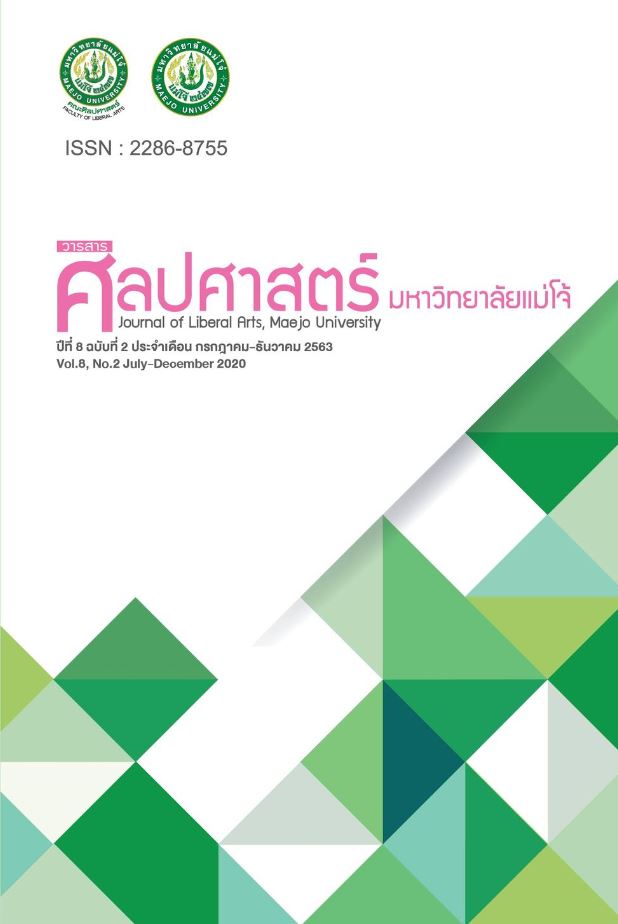Vanquished Nation and Sick Man: Nationness, Masculinity, and Sickness in Yu Dafu’s Sinking
Main Article Content
Abstract
This research article studies a modern Chinese novel, Yu Dafu’s Sinking, based on the concept of masculinity in Chinese society and culture along with the psychoanalytic theory as a framework. The result indicates that nationness and masculinity are related to some extent. When the nation is weak, the citizens of the nation, especially men, are also vulnerable. This is a representation of the discourse "sick man of Asia", which was prevalent in Chinese society from the late 19th century to the early 20th century, through a male character who was weak, depressed, and loveless. The character had constantly faced mental feeling of “sinking”. Finally, he decided to commit suicide by jumping into the sea, which was his physical sinking and the last sinking of his life. However, the death was the only way to fulfill his wishes. It helped him to liberate himself from “power of the father” represented by the society and culture, and transformed him into a part of nature which was the symbol of “mother”.
Article Details
References
2. กองกาญจ์ ตะเวทีกุล. (2560). วรรณกรรมกับจิตวิทยา. วรรณคดีทัศนา ๒ วรรณกรรมข้ามศาสตร์. กรุงเทพฯ: โครงการเผยแพร่ผลงานวิชาการ คณะอักษรศาสตร์ จุฬาลงกรณ์มหาวทิยาลัย, 7-38.
3. ยศ สันตสมบัติ. (2550). ฟรอยด์และพัฒนาการของจิตวิเคราะห์: จากความฝันสู่ทฤษฎีสังคม. พิมพ์ครั้งที่ 4. กรุงเทพฯ: มหาวิทยาลัยธรรมศาสตร์.
4. รัชกฤช วงษ์วิลาศ. (2560). อ่าน 13 บุปผาแห่งนานกิง ของเหยียนเกอหลิงใหม่ในฐานะตัวบทประวัติศาสตร์สตรีชายขอบ. การประชุมวิชาการระดับชาติจีนศึกษามหาวิทยาลัยธรรมศาสตร์ ครั้งที่ 3, 19-42.
5. ____________. (2563). ภาพแทน “ความเป็นอื่น” ของผู้หญิง: สำนึกสตรีกับความป่วยไข้ในวรรณกรรมจีนสมัยใหม่. วารสารจีนศึกษา. 13(1), 1-37.
6. อวี้ต๋าฟู. (2562). จม. แปลโดย รัชกฤช วงษ์วิลาศ. ใน ปกรณ์ ลิมปนุสรณ์. เกิดใหม่ในกองเพลิง. กรุงเทพฯ: มติชน, 105-162.
7. Louie, K. & Low, M. (2003). Asian Masculinities: The Meaning and Practice of Manhood in China and Japan. London: RoutledgeCurzon.
8. Mann, Susan. (2000). The Male Bond in Chinese History and Culture. The American Historical Review. 105(5), 1600-1614.
9. 韩晗.(2018).民族主义、文化现代化与现代科学的传播——以“东亚病夫”一词的流变为中心. 关东学刊.2018(4),19-31.
10. 雷金庆.(2012).男性特质论:中国的社会与性别.上海:学林出版社.
11. 钱理群,温儒敏,吴福辉.(1998).中国现代文学三十年.北京:北京大学出版社.
12. 郁达夫.(2003).郁达夫.北京:中国社会科学出版社.

